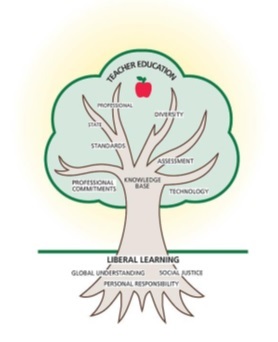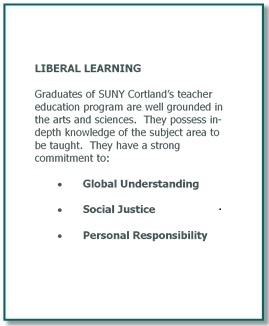Teacher candidates in all programs of study are expected to develop and reflect the dispositions that are delineated in professional, state, and institutional standards and that are implicit in these themes. Teacher candidates are expected to conduct themselves as professionals in every respect. If there are any questions about what constitutes professional conduct, teacher candidates are urged to consult their university supervisors, their mentor teachers, and/or their student teaching/program coordinators. Teacher candidates are reminded that they are subject to the University’s Code of Student Conduct both on and off campus.
Student teaching supervisors will evaluate the teacher candidate’s conduct following each student teaching placement.
The teacher candidate’s conduct is evaluated using the following scale:
Unacceptable Acceptable Target
Categories of Assessment:
- Integrity
- Emotional Maturity
- Work Ethic
- Fairness and Empathy
- Collegiality
- Respect for Policies and Procedures
EPP Disposition
The Student Teacher Evaluation (STE) is a holistic, 18-item evaluation used to measure proficiency of all SUNY Cortland student teachers. Each item in the STE is informed by the InTASC Standards, the Council for the Accreditation of Educator Preparation (CAEP) Standards and the Danielson Framework for Teaching Evaluation. This will be done twice during each placement.
The STE items are categorized into four essential teaching domains including:
- The learner and learning
- Content
- Instructional practice
- Professional responsibility
The teacher candidate’s performance will be rated on the following scale:
Unsatisfactory (U) Developing (D) Proficient (P) Exemplary (E)
The Student Teacher Evaluation (STE) Rubric contains specific criteria for each level.
As the capstone experience in the teacher preparation program, student teaching is full-day, full-time commitment lasting one full semester. The final grade is determined through collaboration between the university supervisor and the mentor teacher.
The following are used to determine the final grade:
- Daily and/or weekly evaluations by the mentor teacher
- Observations with written evaluations by the university supervisor
- Mid-quarter and final “Student Teacher Evaluation” (STE) completed and submitted by the * mentor teacher, university supervisor and teacher candidate.
* Mentor teachers will receive an email from the Watermark Manager at SUNY Cortland to their school email address with a URL (link) with directions for submitting the STE for their student teacher.
The following grades can be assigned:
- Honors: Some programs have an “honors” designation for exemplary performance.
- Satisfactory: Teacher candidates who demonstrate satisfactory performance in student teaching receive a grade of “S” (satisfactory)
- Unsatisfactory: Teacher candidates who do not demonstrate satisfactory performance receive a grade of “U” (unsatisfactory), which carries no credit
- Incomplete: A teacher candidate may be awarded a grade of “INC” (incomplete) only when they are performing satisfactorily and
- an extension is recommended by the university supervisor for required assignments to be submitted to the mentor teacher and/or university supervisor or,
- the student teaching experience is extended in order that the teacher candidate may make up days that were missed due to an approved absence
If an “incomplete” grade is assigned, the university supervisor will submit a written statement to the Director of the Field Experience and School Partnerships Office and the program/department coordinator describing the circumstances necessitating the incomplete and the timeline for completion of make-up work and student teaching. An incomplete grade should only be assigned if the student teacher needs to make up work and/or days in the classroom due to illness, family emergency or other types of extenuating circumstances. A grade of incomplete should not be assigned due to poor performance.
If a circumstance arises that necessitates withdrawal from student teaching, the teacher candidate will be assigned a grade of “X,” if the withdrawal falls within the time period allowed by university policy and academic calendar.
A formal withdrawal from course form must be completed and signed by the teacher candidate, university supervisor, academic advisor, and Associate Dean.
If the teacher candidate’s performance is not satisfactory at the time of withdrawal, the student teaching supervisor should inform the program coordinator and a plan for remediating the student teacher’s performance should be created and implemented before the student teacher can register for another quarter or semester of student teaching.
The teacher candidate can be removed at any time during the student teaching experience and receive a grade of “unsatisfactory” if:
- the university supervisor, mentor teacher, program/department coordinator or building administrator determines that the teacher candidate’s performance is not satisfactory, and that minimal competence for completing the placement cannot be achieved and/or,
- in the judgment of these individuals, the teacher candidate’s presence in the classroom is a detriment to the public-school class
In an effort to support student teachers who are struggling to meet expected performance standards, the college supervisor, in consultation with the mentor teacher, should identify as early as possible in the student teaching experience any teacher candidate who is at risk of receiving an unsatisfactory grade and notify in writing the department chair, program/department coordinator and the Director of the Field Experience and School Partnerships Office.
In such cases, the college supervisor should provide the teacher candidate with a written evaluation after each observation that outlines strengths of the lesson and instructional methodology and which specifies any deficiencies that need to be addressed to achieve a satisfactory grade. If improvement is not observed, the college supervisor, in collaboration with the mentor teacher, will develop a contract that provides recommendations for addressing the deficiencies and provides a timeline for demonstrating satisfactory performance. The teacher candidate should sign the contract and all original observation reports before returning them to the college supervisor; the college supervisor should then provide the teacher candidate with a copy of the contract and each observation report.
When a teacher candidate has been unable to remedy deficiencies in the time specified in the contract, the teacher candidate will be removed from the placement and an “unsatisfactory” grade will be assigned. Any teacher candidate who earns an "unsatisfactory" grade for student teaching must undergo successful remediation before they can repeat student teaching.
After a grade of “Unsatisfactory” has been assigned to a student teacher, the grade and factors contributing to it are reviewed by a Departmental Review Council composed (at a minimum) of the department chair, the university supervisor who has assigned the grade of “Unsatisfactory,” and a faculty member named by the department chair. The teacher candidate is interviewed and asked to reflect on factors contributing to their unsatisfactory performance during student teaching.
If the candidate wants to repeat the student teaching experience, they will need to register for STE 497: Student Teaching Extension (undergraduates) or STE 697: Student Teaching Extension (graduate students). The Review Council will develop a Student Teaching Extension Agreement (form provided by the program) that will form the basis of the extension course and help the teacher candidate address the deficiencies that led to the “unsatisfactory” grade. The duration of the extension course and number of credits assigned to the course is determined by the Review Council.
Once the Student Teaching Extension Agreement is approved by the department, the FESP Office, the dean’s office, and the department chair will work with the registrar’s office to create the extension course and assist the candidate in enrolling in that course.
A faculty member or supervisor, identified by the department, will be assigned as the instructor of the course and will be responsible for overseeing and facilitating the extension course. The instructor will be paid the equivalent salary to the supervision of one student teacher for one quarter (eight weeks). This course will be tailored to the teacher candidate’s specific deficiencies and may require, at a minimum, any/all of the following:
- The taking or retaking of appropriate coursework.
- Personal counseling.
- Additional experiences with children at the developmental level of the certificate sought.
- Summaries and reflections from specific readings.
- Observations (with written summaries and reflections) of effective teacher(s) at grade levels of the certificate sought.
- Presentation of mini-lessons to remediation coordinator.
- Other remedial steps appropriate to the deficiencies identified.
The extension course is to be completed successfully before the candidate is allowed to repeat the failed experience. The failed student-teaching experience may be repeated only once.
Approved by TEC in Spring 2019
A teacher candidate who withdraws from student teaching and wishes to register again, must obtain permission from their program/department coordinator to re-enroll in the course. If permission is granted, the teacher candidate must repeat the entire application process.
Teacher candidates should be familiar with all respective Fair Process Policies and Procedures for
Review of Professional Competencies in Teacher Education:
- Teacher Candidate Consultation Policy
- Student Due Process Information
- Fair Process Policy
The teacher candidate is to submit the Student Teacher Evaluation (STE) through Watermark by the assigned due dates for their student teaching experience(s).
At the end of each session, the teacher candidate is to complete both the Student Teacher Satisfaction Survey of the university supervisor and the mentor teacher(s) through Watermark.
Any questions or problems related to evaluation of the student teaching experience should first be discussed with the teacher candidate’s mentor teacher and university supervisor. If the situation requires further attention, the student teaching program/department coordinator should be contacted.


